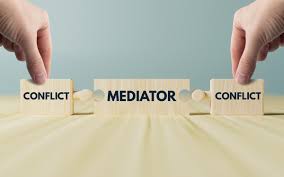
The Power of Mediation: Resolving Conflicts Amicably
Mediation is a powerful tool for resolving conflicts and disputes in a peaceful and constructive manner. Unlike traditional litigation, which can be adversarial and costly, mediation offers a collaborative approach that focuses on finding mutually agreeable solutions for all parties involved.
At the heart of mediation is the idea of open communication and active listening. A trained mediator facilitates discussions between the conflicting parties, helping them to express their concerns, interests, and needs in a safe and non-judgmental environment. By fostering dialogue and understanding, mediation allows individuals to explore creative solutions that may not be possible in a courtroom setting.
One of the key benefits of mediation is its flexibility. Parties have the opportunity to tailor the process to suit their specific needs and preferences, whether it involves family matters, workplace disputes, or community conflicts. Mediation can address a wide range of issues, including parenting plans, business disagreements, property disputes, and more.
Moreover, mediation is often faster and more cost-effective than litigation. By avoiding lengthy court proceedings and legal fees, parties can reach resolutions more efficiently and with less financial strain. This makes mediation an attractive option for individuals seeking timely and affordable solutions to their conflicts.
Another important aspect of mediation is its focus on preserving relationships. Unlike litigation, which can strain interpersonal connections and breed resentment, mediation aims to promote understanding and cooperation among parties. By working together towards a common goal, individuals can rebuild trust and strengthen their relationships moving forward.
In conclusion, mediation offers a valuable alternative to traditional conflict resolution methods by promoting communication, collaboration, efficiency, cost-effectiveness, and relationship preservation. Whether you are facing a personal or professional dispute, consider exploring the power of mediation as a pathway towards peaceful resolution.
7 Essential Tips for Effective Mediation
- Choose a neutral location for mediation.
- Listen actively to the other party’s perspective.
- Stay calm and composed during discussions.
- Focus on finding common ground and solutions.
- Use ‘I’ statements to express your feelings and thoughts.
- Take breaks if emotions escalate to diffuse tension.
- Consider seeking professional mediation assistance if needed.
Choose a neutral location for mediation.
When engaging in mediation, it is crucial to choose a neutral location for the sessions. Selecting a setting that is free from any biases or affiliations can help create a balanced and comfortable environment for all parties involved. A neutral location promotes a sense of fairness and impartiality, allowing participants to focus on productive discussions and reaching mutually beneficial agreements without feeling influenced by external factors. By choosing a neutral location for mediation, individuals can enhance the effectiveness of the process and increase the likelihood of successful conflict resolution.
Listen actively to the other party’s perspective.
Active listening is a crucial aspect of successful mediation. By attentively hearing and understanding the other party’s perspective, individuals can foster empathy, build trust, and create a conducive environment for productive dialogue. Through active listening, participants in mediation can gain valuable insights into the underlying interests and concerns of the other party, paving the way for collaborative problem-solving and mutually beneficial outcomes.
Stay calm and composed during discussions.
Staying calm and composed during mediation discussions is crucial for fostering a productive and respectful atmosphere. By maintaining a sense of composure, individuals can better listen to the perspectives of others, express their own thoughts clearly, and work towards finding common ground. Emotions are natural during conflict resolution, but by staying calm, parties can prevent misunderstandings, reduce tension, and focus on reaching mutually beneficial solutions. Remember, a composed demeanor can help create a positive environment for constructive dialogue and effective problem-solving in mediation sessions.
Focus on finding common ground and solutions.
In mediation, it is crucial to focus on finding common ground and solutions that benefit all parties involved. By identifying shared interests and goals, individuals can work together to reach mutually agreeable outcomes that address their underlying needs. Emphasizing collaboration and compromise over conflict and competition can lead to more sustainable and satisfying resolutions. Through open communication and a willingness to explore creative solutions, mediation offers a pathway towards finding common ground and forging positive agreements that foster understanding and harmony among conflicting parties.
Use ‘I’ statements to express your feelings and thoughts.
When engaging in mediation, it is beneficial to use “I” statements to express your feelings and thoughts. By framing your statements in this way, you take ownership of your emotions and perspectives, which can help prevent defensiveness and promote understanding. For example, saying “I feel frustrated when…” instead of “You always make me angry when…” shifts the focus to your own experiences and encourages a more empathetic dialogue with the other party. This approach can foster open communication and lead to more productive discussions during the mediation process.
Take breaks if emotions escalate to diffuse tension.
When engaging in mediation, it is crucial to recognize the signs of escalating emotions and tension among parties. In such situations, it is highly recommended to take breaks to allow individuals to cool down and regain their composure. By stepping away from the discussion temporarily, participants can diffuse heightened emotions and approach the mediation process with a clearer and more rational mindset. Taking breaks not only helps prevent conflicts from escalating further but also promotes a more productive and constructive dialogue towards reaching a resolution.
Consider seeking professional mediation assistance if needed.
When navigating complex conflicts, it is crucial to consider seeking professional mediation assistance if needed. Mediators are trained professionals who can facilitate productive discussions, guide parties towards mutually beneficial solutions, and ensure a fair and respectful process. By enlisting the help of a mediator, individuals can benefit from their expertise in conflict resolution techniques and their ability to create a supportive environment for open communication. Professional mediation assistance can make a significant difference in reaching successful outcomes and fostering positive relationships among all parties involved.
